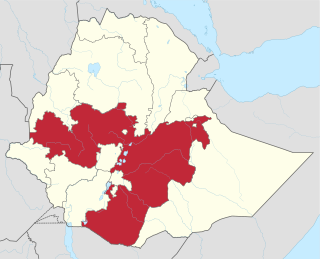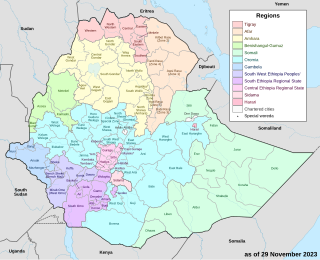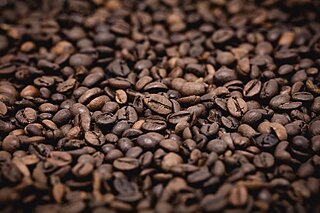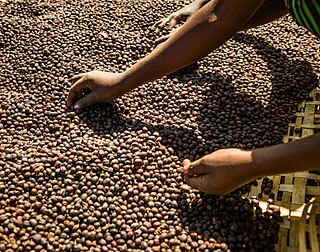
Fair trade is a term for an arrangement designed to help producers in developing countries achieve sustainable and equitable trade relationships. The fair trade movement combines the payment of higher prices to exporters with improved social and environmental standards. The movement focuses in particular on commodities, or products that are typically exported from developing countries to developed countries but is also used in domestic markets, most notably for handicrafts, coffee, cocoa, wine, sugar, fruit, flowers and gold.

Starbucks Corporation is an American multinational chain of coffeehouses and roastery reserves headquartered in Seattle, Washington. It was founded in 1971, and is currently the world's largest coffeehouse chain.

Oromia is a regional state in Ethiopia and the homeland of the Oromo people. Under Article 49 of Ethiopian Constitution, the capital of Oromia is Addis Ababa, also called Finfinne. The provision of the article maintains special interest of Oromia by utilizing social services and natural resources of Addis Ababa.

Borena is a zone in Oromia Region of Ethiopia. Borena is named after one of the two major subgroups of the Oromo People. Borena is bordered on the south by Kenya, on the west by the Southern Nations, Nationalities, and Peoples Region, on the north by West Guji and Guji and on the east by Dawa Zone Somali Region. The highest point in this zone is Mount Dara Tiniro. Cities and major towns in this Zone include Negele Borana, Moyale, Yabelo, Dubuluk, Mega, Millami, Surupa and Bakke.

Simcha Jacobovici is a Canadian-Israeli journalist, documentary filmmaker and New York Times best-selling author.

Coffee is a popular beverage and an important commodity. Tens of millions of small producers in developing countries make their living growing coffee. Over 2.25 billion cups of coffee are consumed in the world daily. Over 90 percent of coffee production takes place in developing countries — mainly South America — while consumption happens primarily in industrialized economies. There are 25 million small producers who rely on coffee for a living worldwide. In Brazil, where almost a third of the world's coffee is produced, over five million people are employed in the cultivation and harvesting of over three billion coffee plants; it is a more labor-intensive culture than alternative cultures of the same regions, such as sugar cane or cattle, as its cultivation is not automated, requiring frequent human attention.
Adola is one of the woredas in the Oromia Region of Ethiopia. It is part of former Adolana Wadera woreda what was divided for Adola, Girja and Wadera woredas and Adola town. Part of the Guji Zone, Adolana Wadera was bordered on the south by Liben, on the southwest by Odo Shakiso, on the west by Bore, on the north by the Southern Nations, Nationalities, and Peoples Region, and on the east by the Bale Zone.
The Oromia Coffee Farmers’ Cooperative Union (OCFCU) is a smallholder farmer-owned cooperative union based in the Oromia region of Ethiopia. The aforementioned region is characterized by its unique native vegetation and tropical climate conducive to coffee bean growth. OCFCU is a democratic, member-owned business operating under the principles of the International Cooperative Alliance and Fair trade, and the Union plays a central role in the Ethiopian coffee marketing chain. The members of OCFCU grow, process, and supply organic Arabica coffee for export.

Deforestation in Ethiopia is due to locals clearing forests for their personal needs, such as for fuel, hunting, agriculture, and sometimes religious reasons. The main causes of deforestation in Ethiopia are shifting agriculture, livestock production and fuel in drier areas. Deforestation is the process of removing the forest ecosystem by cutting the trees and changing the shape of the land to suit different uses.

The Sundance Film Festival is an annual film festival organized by the Sundance Institute. It is the largest independent film festival in the United States, with 423,234 combined in-person and online viewership in 2023. The festival takes place every January in Park City, Utah; Salt Lake City, Utah; and at the Sundance Resort, and acts as a showcase for new work from American and international independent filmmakers. The festival consists of competitive sections for American and international dramatic and documentary films, both feature films and short films, and a group of out-of-competition sections, including NEXT, New Frontier, Spotlight, Midnight, Sundance Kids, From the Collection, Premieres, and Documentary Premieres. Many films premiering at Sundance have gone on to be nominated and win Oscars such as Best Picture, Best Director and Best Actor in a Leading Role.

Coffee production in Ethiopia is a longstanding tradition which dates back dozens of centuries. Ethiopia is where Coffea arabica, the coffee plant, originates. The plant is now grown in various parts of the world; Ethiopia itself accounts for around 17% of the global coffee market. Coffee is important to the economy of Ethiopia; around 30-35% of foreign income comes from coffee, with an estimated 15 million of the population relying on some aspect of coffee production for their livelihood. In 2013, coffee exports brought in $300 million, equivalent to 24% of that year's total exports.
Tadesse Meskela is the General Manager of the Oromia Coffee Farmers Cooperative Union of Ethiopia and was featured in the documentary Black Gold. He is a proponent of fair-trade, and speaks publicly in support of it around the world.
Seattle is regarded as a world center for coffee roasting and coffee supply chain management. Related to this, many of the city's inhabitants are coffee enthusiasts; the city is known for its prominent coffee culture and numerous coffeehouses.
Speakit Films is a British film production company established in 2004 by writer, director and producer team Nick Francis and Marc J. Francis.

When China Met Africa is a 2010 documentary film by Nick Francis and Marc James Francis. Set on the front line of Chinaʼs foray into Africa, it follows the lives of a Chinese farmer, a road builder, and the Zambian trade minister.

Starbucks, an American coffee company and coffeehouse chain, is the subject of multiple controversies. Public and employee criticism against the company has come from around the world, including a wide range issues from tax avoidance in Europe, anti-competitive practices in the United States, human rights issues in multiple countries and labor issues involving union busting, questions about pay equity and ethics in partnerships in Africa.

The Cinema of Ethiopia and the film industry in general are relatively recent phenomena in Ethiopia. The Ethiopian film industry is growing but faces many problems that have prevented it from fully flourishing. Historically, live stage theater enjoyed more popularity in Ethiopia, creating a handful of relatively successful stage actors. Ethiopian films began modernizing in the 2000s, implementing Amharic, but due to wide home video and DVD distribution, they are often frustrated by copyright infringement in the presence of piracy. This was reduced in the early 2010s with the intervention of the government and the imposition of policy. Despite recent developments, the Ethiopian film industry continues to lack quality compared to modern world cinema and has a low budget amateurish style.

The Oromo conflict is a protracted conflict between the Oromo Liberation Front (OLF) and the Ethiopian government. The Oromo Liberation Front formed to fight the Ethiopian Empire to liberate the Oromo people and establish an independent state of Oromia. The conflict began in 1973, when Oromo nationalists established the OLF and its armed wing, the Oromo Liberation Army (OLA). These groups formed in response to prejudice against the Oromo people during the Haile Selassie and Derg era, when their language was banned from public administration, courts, church and schools, and the stereotype of Oromo people as a hindrance to expanding Ethiopian national identity.

Marc James Francis is a British film director, producer and documentary cinematographer.
Black Harvest is a 1992 Australian-Papua New Guinea documentary directed by Australians Bob Connolly and Robin Anderson. It is the third film in 'The Highlands Trilogy', concluding the series which includes the 1983 film First Contact and the 1989 film Joe Leahy's Neighbours.













